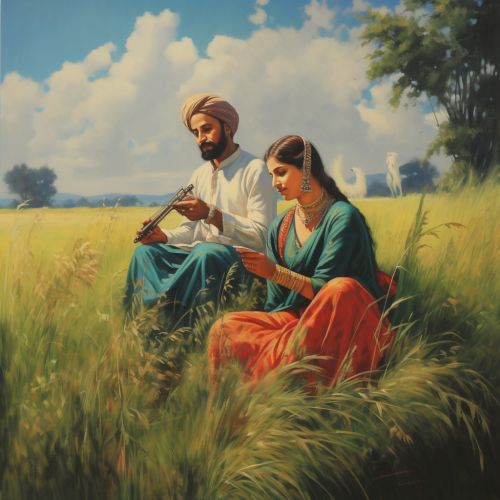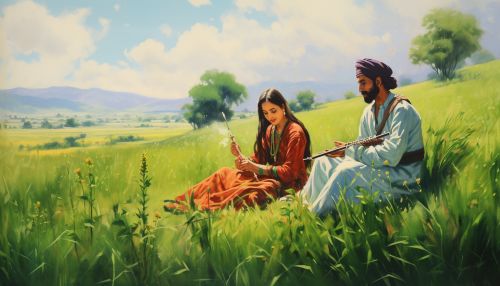Heer Ranjha
Origins and History
"Heer Ranjha" is a classic folk tale from the Punjab of the Indian subcontinent. This tragic romance is one of the four popular tragic romances of Punjab, the others being Sohni Mahiwal, Mirza Sahiban, and Sassi Punnun. The story was first recorded by Waris Shah, a Punjabi Sufi poet, in 1766. His version is considered the most definitive and is still widely read in the Punjab today.


Characters
The story revolves around two main characters: Heer and Ranjha. Heer, the daughter of a wealthy Jat landowner named Chuchak, is the epitome of beauty in her village of Takht Hazara. Ranjha, the youngest of four brothers, hails from the village of Zaida, where he leads a life of leisure, playing the flute and tending to his father's cattle.
Plot
The story begins with Ranjha leaving his village after a dispute with his brothers over land. He wanders until he reaches Heer's village, where he is taken in by Heer's father and given a job as a cowherd. Heer and Ranjha soon meet and fall in love. However, their love is not accepted by society due to their different social statuses.
Heer's parents, under societal pressure, arrange her marriage to another man, Saida Khera. Heartbroken, Ranjha leaves the village. He meets a group of Sufi saints, or 'jogis', and becomes one himself in his despair. He wanders around until he eventually finds Heer again.
With the help of Heer's friend, Sehti, they plan to elope. However, their plan is discovered, and Ranjha is arrested. Heer is forced into her marriage with Saida.
The story ends tragically when Heer's jealous uncle, Kaido, poisons her on her wedding night to prevent her from being with Ranjha. When Ranjha hears of Heer's death, he rushes to her side and, finding her dead, dies of a broken heart.
Themes
"Heer Ranjha" is not just a tragic love story but also a reflection of the societal norms and values of the time. It explores themes of love, societal pressures, class differences, and the struggle against fate. The story is often interpreted as a metaphor for the human soul's quest for union with the divine.
Legacy
"Heer Ranjha" has left a significant impact on Punjabi literature and culture. It has been adapted into numerous films, plays, and songs in both India and Pakistan. The story's themes of love, tragedy, and societal norms continue to resonate with audiences today.
